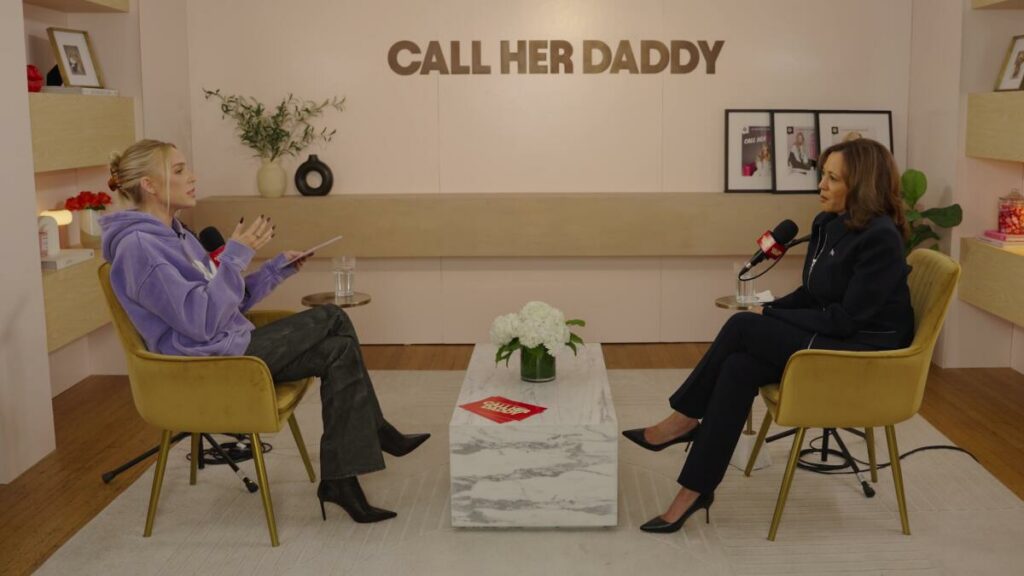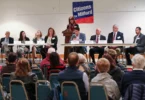
By Shira Levy
Boston University News Service
Boston University Alum Alex Cooper is the host and creator of the “Call Her Daddy” podcast. Her podcast began as a conversation about relationships, dating and sex. The podcast is humorous and empowering for young women listeners who refer to themselves as the “Daddy Gang.”
Her podcast has evolved to include more topics including personal growth, mental health and commentary about culture. Her style is known as honest and relatable storytelling that attracts younger audiences and Generation Z women in particular.
Vice President Kamala Harris was brought on as a podcast guest to discuss “women’s bodies and how women are treated and valued in this country,” Cooper said. This move was very controversial, for both Harris and Cooper, and has stirred many social media conversations and debates on college campuses. This podcast diverges from traditional political discourse and is therefore heavily appreciated and criticized.
Julia Lacasse, a BU freshman, appreciated Harris’ decision to go on “Call Her Daddy.” Lacasse said she saw it as a smart way for Harris to connect with young voters, especially young women.
“It really sold her to female voters who may be concerned about reproductive issues,” Lacasse said.
Harris also spoke about her career and her mother’s influence in her life, which was a very personal way to relate to voters. Harris’ appearance aligns with broader trends in how political figures are engaging with younger audiences.
With the overturning of Roe v. Wade, an overwhelming number of “Call Her Daddy” listeners reached out to Cooper about their struggles, expressing the need for platforms that address women’s issues directly.
Generation Z, a demographic cohort of people born between the mid-to-late 1990s and early 2010s, saw this interview as a timely response because it reflected a desire among young women for political discourse that resonates with their personal lived experiences.
Jada Cohen, a freshman at Northeastern University, shared a similar view on the podcast. She said she felt that Harris’ passion enabled her to connect with the presidential candidate on a deeper level.
“Her raw passion stood out—she felt authentic and genuine,” Cohen said, highlighting how Harris’ candid approach humanizes her more than just sharing her political policies.
Even right wing college students like Charlie Leeds from California thought the podcast painted her in a positive light, even though he expressed skepticism about Harris’ general policies. “Hearing about her life is interesting and good,” he said, reflecting a nuanced perspective among younger listeners who may consume content from various political viewpoints.
There were some student reactions that included extreme criticism and profanity regarding Harris’ choice, but those individuals wished to keep their views anonymous.
The podcast episode has sparked notable attention on platforms like TikTok, where users are sharing edits and clips.
Rosi (@rosiflx) posted a montage that included Harris alongside pop culture icons, like Taylor Swift, which resonated positively with viewers. Many comments celebrated her as a powerful speaker, with some proclaiming “That’s my president.”
A TikTok video from @stay.in.the.know noted that Cooper aimed to focus on women’s rights rather than more traditional political topics. Commenters agreed that this approach was appropriate for her audience, primarily composed of female listeners.
BU Freshman Elsie Cohen said, “I’m partly surprised that Alex Cooper made it political, but I also feel like she knows her audience and most of her supporters share similar views to her. She handled it really well, especially by acknowledging that it’s not her usual topic.”
Former Trump aide Sara Matthews, who discussed the podcast on @jenpsaki’s verified account, emphasized its effectiveness in uplifting women who feel attacked by the current political climate. Commenters on the post noted that this outreach could resonate with voters in traditionally conservative states—enhancing Harris’ appeal.
Furthermore, Harris’ comments about how women do not always aspire to be humble resonated with listeners like @illbecrown, who found empowerment in Harris’ words. This aspect of the conversation points to a growing desire among young women to see themselves represented equally in political discourse.
On the other hand, criticism also emerged from right-leaning commentators who question the value of such media appearances.
On the Full Send Podcast hosted by Kyle Forgeard, former President Donald Trump disagreed with Harris’ decision, calling Harris “crazy” for joining the show “during a hurricane.” Harris supporters shot back by pointing out the hypocrisy of his own media engagements during crises.
Trump said he has watched some “Call Her Daddy” podcast episodes and has negative feelings about Cooper. “I’m sorry women, she’s [Alex Cooper’s] a dummy,” Trump said on NEWSMAX live in Scranton, PA after the podcast episode was released.
On TikTok, Meech (@meechski) sparked a debate by pointing out what he found embarrassing about Harris’ comments regarding laws governing men’s bodies—highlighting the complexity of gender politics in today’s discourse. Meech’s statements drew criticism, with many users countering that the comparison of reproductive rights to war drafts was not analogous.
Additionally, @thesabrinak on TikTok argued that the episode may hurt Cooper’s credibility more than help Harris. She said that Cooper’s audience is predominantly liberal, indicating a missed opportunity to engage undecided voters.
Cooper’s decision to have Harris on her podcast has triggered overwhelming discourse across social media platforms and college campuses. While the episode has faced a lot of criticism, it brings to light an increasing demand for genuine political engagement that connects with younger audiences.
As social media continues to uncover diverse perspectives and often hidden voices, this collaboration of pop culture and politics stands as a notable moment in how political figures communicate with Generation Z voters.







